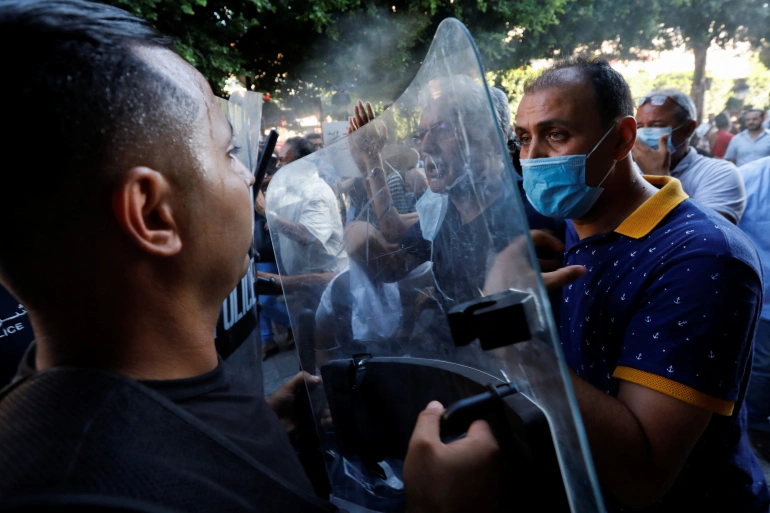Police arrest leading gay activist in crackdown on Tunisia rally
Police have arrested a leading gay rights campaigner in a violent pushback against young people during a rally against the upcoming referendum on the Tunisian president’s newly proposed constitution. Police violently shoved protesters marching on Friday in a vocal but peaceful demonstration as they headed towards the Ministry of Interior in the centre of Tunis to demonstrate against President Kais Saied’s newly penned constitution and demand an end to the referendum process.
Al Jazeera witnessed beatings and other violent abuses of protesters, and also saw police use pepper spray. President Saied published his new draft constitution at the end of last month, ahead of a referendum scheduled for July 25 where Tunisians will vote to accept or reject the document.
July 25 marks a year since Saied sacked Tunisia’s prime minister, suspended parliament and assumed executive authority, citing a national emergency in a move critics have called a coup. Two months later he announced he would rule by decree, and dismantled many of the country’s democratic state institutions including the Supreme Judicial Council. In June, he fired dozens of judges accusing them of corruption and “terrorism”, further consolidating his power.
Thousands join Budapest Pride march in sweltering heat
In sweltering temperatures, thousands of Hungarians took part in the annual Budapest Pride march on Saturday, vowing to keep up their fight against government policies on LGBTQ rights that have drawn EU condemnation.
The European Commission sued Hungary earlier this month over a law passed last year to limit teaching about homosexuality and transgender issues in schools, the latest anti-LGBTQ measure to be passed by the government of Prime Minister Viktor Orban.
The law has been billed by his administration as a way to protect children, but human rights groups said it discriminated against LGBTQ people and it was labeled a “disgrace” by European Commission President Ursula von der Leyen.
“I am a queer myself and it’s important that we show ourselves especially in a country where the political sentiment is like this towards LGBTQ people,” said one Pride participant, as crowds marched through the capital with rainbow flags and umbrellas in temperatures of 40 degrees Celsius (104 Fahrenheit).
Orban’s Fidesz-Christian Democrat government, which won elections in April, says LGBTQ rights and other such social issues are matters for national governments to decide in the European Union.
Orban, in power since 2010, owes some of his electoral success to a tough line on immigration, and promoting social policies that he says aim to safeguard traditional Christian values from Western liberalism.
Cuba Assembly opens door to gay marriage, other family rights
Cuba’s National Assembly on Friday approved a sweeping update of its family law which opens the door to allowing gay marriage, greater women’s rights, and increased protections for children, the elderly and other family members. The new Families Code will be put to a referendum vote on September 25 after being debated in community meetings earlier this year, where organisers said 62 percent of participants expressed their support. That is relatively low by Cuban standards, where the recently passed new constitution was approved with 86 percent of the vote. Policy proposals in previous referendums have seen support of around 95 percent.
The code promoted “love, affection, care, sensitivity, respect for others and the harmony of our families,” Minister of Justice Oscar Manuel Silvera said, presenting the code for the vote at the National Assembly. Opponents to the rule change include many churches.
The new code would legalise same-sex marriage and civil unions, allow same-sex couples to adopt children, and promote equal sharing of domestic responsibilities. It will also allow prenuptial agreements and surrogate pregnancies, though not for profit.
Parents would have “responsibility” instead of “custody” of children, and be required to be “respectful of the dignity and physical and mental integrity of children and adolescents”.
Cuba is already a regional front-runner in women’s rights. Women head up nearly 50 percent of households and make up 60 percent of professionals, have free access to abortion, and can claim up to two years’ maternity leave.
Two apparent homophobic attacks reported at Berlin Pride
Two apparent homophobic attacks were reported following Berlin’s annual pro-LGBTQ Christopher Street Day celebration on Saturday, police said this week. In one incident, two girls, aged 16 and 17, and a 15-year-old boy were confronted by a group of nine people in Berlin’s Mitte neighborhood on Saturday evening. The group approached the two girls and made anti-gay remarks to the two girls, police said, presumably because of their clothing.
When the 16-year-old girl answered, one man in the group knocked her hat off her head and tripped her, causing her to fall to the ground. When she stood back up, the same man punched her in the face, then fled.
The girl suffered light injuries, including a wound on her lip, but declined help from emergency services. In central Berlin at around 3:15 a.m. Sunday, a group of eight people insulted a 32-year-old man. As he ran away, they caught up to him and physically attacked him, kicking his head and upper body while he lay on the ground. A woman passing by saw the attack and stood in front of the victim, at which point the attackers fled. The man sustained cuts and bruises and was treated on an outpatient basis.
The incidents came at the end of a day in which hundreds of thousands came out to support LGBTQ rights around the city. Final police estimates put the overall crowd size at 350,000, after revising its initial estimate of 150,000. The parade itself was peaceful, police said.
